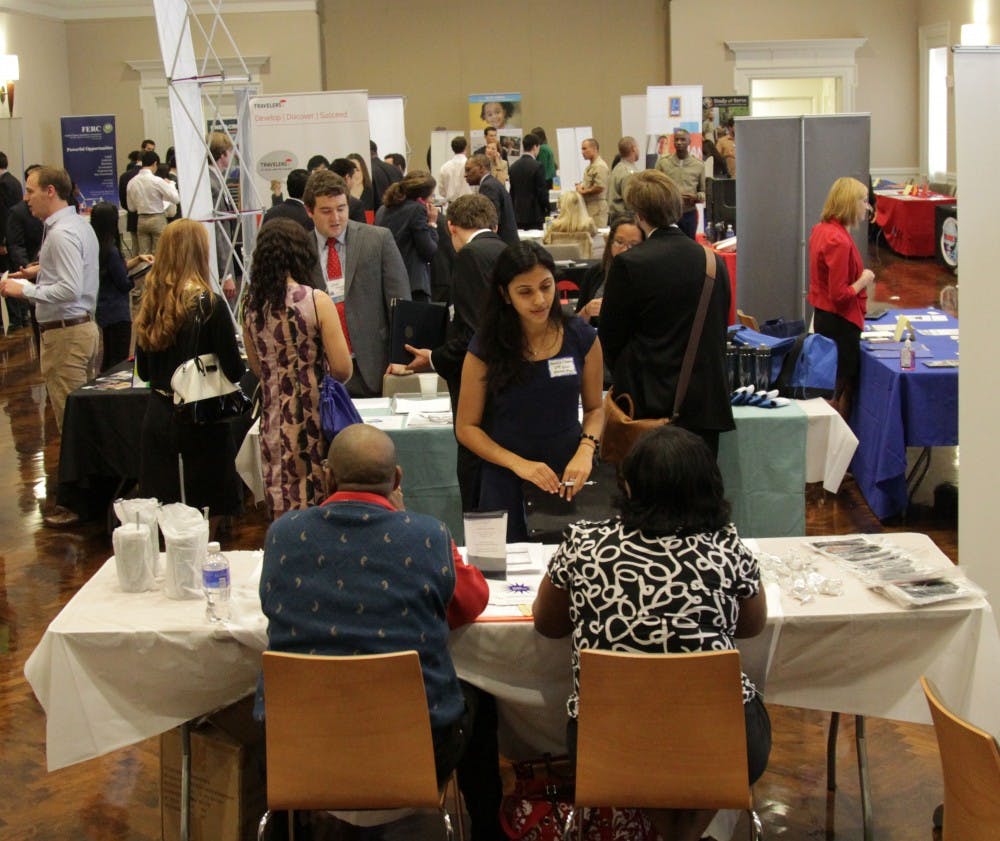The Career Center has begun to move toward holding more specialized career fairs in addition to its annual Job and Internship Career Fair. While there are no specific data on whether the annual Job and Internship Career Fair yields job offers, employers continue to return to the University to recruit students every year.
David Lapinski, director of employer relations at the University Career Center, said the center does not track data on student outcomes resulting from the career fairs due to the inability to pinpoint exactly where students may have made contact with a company.
“Sometimes it can be difficult for [the companies] to say because a company can have multiple touch points with the students,” Lapinski said. “It could be information sessions, it could be career fairs, it could be coffee chats, different things like that, what’s the impetus of where it actually started.”
The University Career Center measures student outcomes annually based on the most recent graduating class through its Student Outcome Activity Report. However, the report does not measure how students first come into contact with their employing companies.
“It’s our survey that we release in December and then we run it through six months after the graduation to help understand student outcomes, in terms of their jobs and internships and so forth,” Lapinski said. “We don’t have a direct tie back to the career fair.”
Some employers, like Accenture, Oracle and IBM, return to multiple University career fairs every year. Consulting firms look for a wide range of skills to fill out their companies’ goals of catering to a diverse clientele, Lapinski said.
“Really, major doesn't matter,” Lapinski said. “They’re looking for diverse skill sets, they’re looking for smart students that come from diverse majors, because they want a base of consultants that mirror their clients.”
Employer feedback the Career Center has received in the past shows employers return to the University’s career fairs due to the quality of student preparedness.
“[U.Va. students] come in prepared to understand the organizations,” Lapinski said. “I think that's a great attribute of U.Va. students that is impressive to the organizations and why they keep coming back.”
Although the Career Center does not solicit student feedback for the annual Job and Internship Career Fair, it did conduct surveys on the start-up fair, one of its more specialized fairs conducted last spring. The event design forewent a typical career fair structure for a much more relaxed atmosphere, Lapinski said.
“We really solicited feedback from the start up fair,” Lapinski said. “We haven’t done that for the others, but I think that’s something that we could probably do just to see if there’s some things in terms of logistics and setup that would be helpful to students.”
Lapinski said in the past, it was commonly believed career fairs were on the way out, but they continue to be in demand. Lapinski said the Career Center has focused on scheduling more specialized career fairs for sectors such as finance and global development.
“All you need is one side of the market to react in a way that they say we don’t need to come together to form this because it's found in another mechanism,” Lapinski said. “There's still demand from both sides.”
Tara Shafiei, a 2015 Batten graduate, received two job offers from a consulting firm and a teaching organization after she met recruiters from both organizations at the fall 2015 Job and Internship Fair.
“[The career fair] was where I met them and talked to them for the first time,” Shafiei said. “Going to the career fair was a gateway for getting those interviews because if I hadn’t gone to the career fair I probably wouldn’t have gotten those interviews, I’d just be another resume in a pile.”
As for Shafiei’s experiences with the Career Center following her initial interactions with companies at the career fair, she said the Career Center prepared and connected her for the application process.
“They're just more of the middleman to help you connect to the recruiters,” she said. “They’re a great place to start, but when the recruiting actually begins, you spend less time at the Career Center and more time talking to the recruiter.”
From her experience at the career fair, Shafiei said students need to put in time and energy to research companies before approaching them at the career fair and connecting with recruiters.
“It definitely makes a difference with the recruiter if they notice you because they'd be willing to waive certain requirements for you,” she said. “Going to the career fair, if you're prepared, will reward you and, if you’re not, it won’t.”
Shafiei said while four of her friends went through the application process for the consulting firm and two of them received offers, the career fair still provided a way for students to connect with employers face-to-face.
“Not everyone will get a position, but the career fairs open those doors for you,” she said. “It’s more personable, it’s not just dropping off your resume at Google like everyone’s going to do.”
Oracle, Accenture and IBM did not respond to comment by press time.







